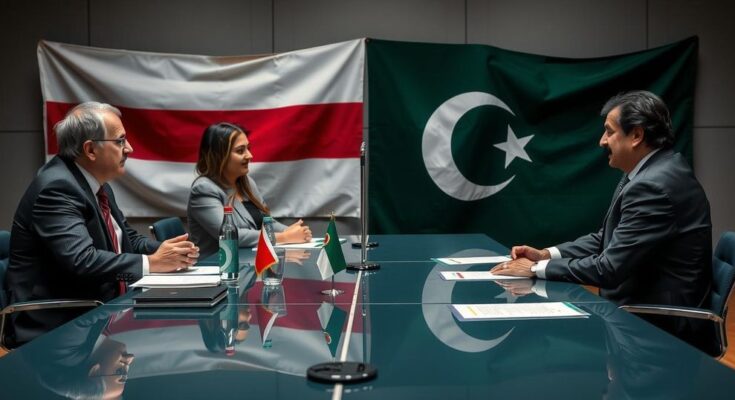Argentina, once a leading economy, has experienced a remarkable turn under President Javier Milei, dramatically reducing inflation from over 200% to single digits through significant economic reforms. Observers in Pakistan are considering Milei’s strategies as potential solutions for their ongoing economic distress. However, Milei’s biases and historical misconceptions raise questions about his broader economic narrative, illustrating the need for a leader in Pakistan who embraces sound economic principles without falling prey to ideological extremes.
Argentina and Pakistan share a common narrative of economic turmoil, despite once being recognized as prosperous. Argentina, under the leadership of President Javier Milei, has been experiencing notable improvements in its economy over the past year, including a drastic reduction in inflation from over 200 percent to single digits. This remarkable turnaround, attributed to Milei’s policies of minimizing governmental size and abolishing regulations, has garnered attention worldwide, provoking discussions about similar approaches for Pakistan’s own economic struggles.
Milei’s recent podcast with Lex Friedman provides profound insights into his economic strategies and rationale. His insistence on lowering inflation and dismantling price controls reflects a fundamental understanding of the detrimental effects of bureaucratic oversights on the economy. Critics in Pakistan have begun to draw parallels between Milei’s policies and a possible remedy for their ongoing economic issues. However, there are also significant concerns regarding Milei’s broader ideological stance, particularly regarding his views on foreign nations and historic economic claims.
Despite his commendable fiscal strategies, Milei’s biases concerning the Israeli-Palestinian conflict, as well as his selective understanding of economic history, raise serious questions about his objectivity and adaptability. His portrayal of the Industrial Revolution and the Austrian school of economic thought often lacks historical accuracy, misleading arguments concerning key figures such as Adam Smith and Milton Friedman.
Furthermore, while Milei advocates for dollarization in Argentina, critics argue that it contradicts his principles of sovereign economic freedom. As the economic situation in Pakistan remains dire, it is essential to seek a leader reminiscent of Milei—a figure that embraces revolutionary fiscal reforms without the limitations of biased ideologies and misinterpreted economic philosophies. The complexity of Pakistan’s economy demands a nuanced understanding that balances ambitious reforms with informed decision-making.
Ultimately, while Milei’s approaches could serve as a blueprint for economic improvement, the Pakistani context requires leaders who not only challenge the status quo but are also aware of the broader socio-economic implications of their policies.
Economic crises often lead nations to seek innovative solutions, which is evident in the cases of Argentina and Pakistan. Argentina, once the leading economy in South America, faced significant economic challenges, relying heavily on International Monetary Fund support. The election of Javier Milei marked a pivotal turn for the country’s economy, showcasing opportunities for radical reform. In Pakistan, a parallel can be drawn where many look towards Milei’s sweeping reforms as a potential model to overcome persistent economic hardship. This comparative analysis seeks to challenge existing economic paradigms and invites a re-evaluation of ideologies in fiscal policies.
In conclusion, the economic revitalization witnessed in Argentina through Javier Milei’s leadership presents a compelling case for the potential of drastic fiscal reforms. Pakistan, much like Argentina, could benefit from a transformative figure capable of dismantling restrictive regulations and promoting robust economic policies. However, such a leader must also navigate the complexities of economic history and remain unbiased to ensure well-rounded and effective governance. The challenges that both nations face underline the necessity for informed decision-making embedded in a thorough understanding of socio-economic realities, making it imperative for future leaders to be both visionary and grounded in their approach.
Original Source: www.dawn.com




